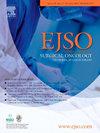IF 3.5
2区 医学
Q2 ONCOLOGY
引用次数: 0
摘要
背景对食管癌切除术后 5 年以上幸存者的长期预后知之甚少。本研究评估了食管癌长期存活者的肿瘤预后。方法数据来源于一项多中心随机对照试验,该试验比较了新辅助化放疗(NCRT)和手术与单纯手术治疗临床 I 期和 II 期食管癌(FFCD9901)。本研究只纳入了接受食管切除术的患者。研究分析了5年生存者的临床病理变量。多变量逻辑回归分析确定了可预测 5 年前死亡的因素。结果从2000年6月到2009年6月,来自法国30个中心的195名患者被随机分配到先接受NCRT治疗再接受手术或仅接受手术的治疗方案中。在接受食管切除术的 170 名患者中,有 70 名患者在 5 年后存活,5 年总存活率为 41.2%。在逻辑回归多变量分析中,WHO表现状态≥1(p = 0.045)、晚期pT类别(p = 0.030)和术后并发症(p = 0.047)预示着5年前的死亡。20 名患者在 5 年后死亡,其中 9 人死于食道癌进展。19名患者罹患第二原发性恶性肿瘤,其中14人罹患头颈部癌症或肺癌。在临床分期的早期疾病中,有一类患者在治疗后 5 年后才出现疾病复发。在这部分人群中,发展为第二原发性癌症构成了临床威胁。应相应调整监测方案。本文章由计算机程序翻译,如有差异,请以英文原文为准。
What are the outcomes for long-term survivors after esophagectomy ? – Evidence from a randomized controlled trial (FFCD9901)
Background
Little is known regarding long-term outcomes of survivors beyond 5 years after esophagectomy. This study assesses oncological outcomes of long-term survivors of esophageal cancer.
Methods
Data is derived from a multi-center randomized controlled trial comparing neoadjuvant chemoradiotherapy (NCRT) and surgery to surgery alone for clinically stage I and II esophageal cancers (FFCD9901). Only patients undergoing esophagectomy were included in this study. Clinicopathological variables of 5-year survivors were analyzed. Multivariate logistic regression analysis identified factors predictive of death prior to 5 years. Patterns of disease recurrence and second primary tumor development were established.
Results
From June 2000 until June 2009, 195 patients from 30 French centers were randomly assigned to NCRT followed by surgery or surgery alone. Of 170 patients who underwent esophagectomy, 70 patients were alive at 5 years - an overall 5-year survival of 41.2 %. In logistic regression multivariate analysis, WHO performance status of ≥1 (p = 0.045), advanced pT category (p = 0.030) and post-operative complications (p = 0.047) predicted death prior to 5 years. Twenty patients died after the 5-year time point, 9 of these due to progression of their esophageal cancer. Nineteen patients developed a second primary malignancy, of whom 14 developed either a head and neck or lung cancers.
Conclusions
Being alive 5 years after esophagectomy does not equate to cure. In clinically staged early disease, a distinct group of patients develop disease recurrence later than 5 years from treatment. Development of a second primary cancer in this population poses a clinical threat. Surveillance protocols should be adapted accordingly.
求助全文
通过发布文献求助,成功后即可免费获取论文全文。
去求助
来源期刊

Ejso
医学-外科
CiteScore
6.40
自引率
2.60%
发文量
1148
审稿时长
41 days
期刊介绍:
JSO - European Journal of Surgical Oncology ("the Journal of Cancer Surgery") is the Official Journal of the European Society of Surgical Oncology and BASO ~ the Association for Cancer Surgery.
The EJSO aims to advance surgical oncology research and practice through the publication of original research articles, review articles, editorials, debates and correspondence.
 求助内容:
求助内容: 应助结果提醒方式:
应助结果提醒方式:


